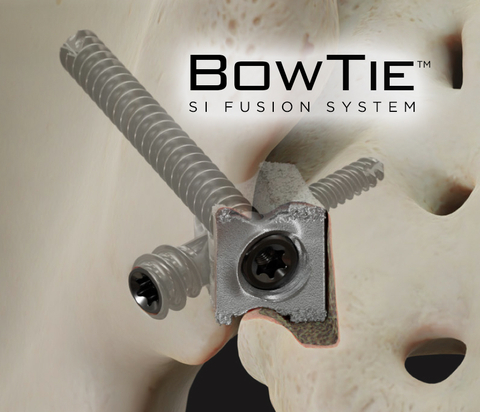DEL MAR, Calif.– SAIL Fusion, a medical device company focused on advancing the surgical treatment of sacroiliac joint dysfunction through solutions built upon proven AO principles, today announced that it has received FDA clearance for its novel BowTie Sacroiliac Fusion System. BowTie is the first SI fusion technology to be based on long-standing, validated joint fusion principles established by the AO foundation and is now the sole commercially available device that incorporates both intra‑articular and transfixing components.
The MIS BowTie technology and its posterior-inferior surgical technique minimize tissue disruption, thoroughly prepare the joint, and provide rigid fixation to enable true and robust arthrodesis. The device features a novel bowtie shape as well as integrated transfixation and iliac screws to maximize rigidity. It also utilizes a proprietary porous structure and roughened surface technology to facilitate osteointegration.
The system will be launched to a select group of initial surgeons in preparation for a greater expansion in the coming months.
“There hasn’t been meaningful differentiation in the SI fusion market for many years,” remarked David Jansen, the President & CEO of SAIL. “By interviewing hundreds of surgeons, we were able to identify an unmet need for robust fixation built on proven AO principles. Our approach challenges the prevailing trend of lateral fixation that is more appropriate for stabilization rather than true joint fusion. To achieve this, BowTie leverages decades of clinically validated arthrodesis methods that have been applied to nearly every other joint.”
Dr. Peter Whang, Professor of Orthopaedics and Rehabilitation at the Yale University School of Medicine, remarked, “I had the pleasure of assisting with the first implantations of the BowTie device as part of an international pilot study last October. It became abundantly clear that the only way to simultaneously accomplish two of the AO’s main joint fusion principles — minimal tissue disruption and thorough joint preparation with grafting — is through a posterior-inferior approach that gives full longitudinal access to the joint. We were able to thoroughly decorticate the joint through a small shallow incision that completely avoided all major neurovascular structures. It’s not surprising to me that the early clinical results have been very encouraging.”
Mr. Jansen added, “The BowTie device, with its trademark bowtie shape, was designed to help achieve the AO’s other significant joint fusion principle of rigidly fixating the joint to provide a biologic environment favorable for bone growth. We reinforced its rigidity by adding both integrated iliac and transfixation screws to address the complex biomechanics of the pelvis. We are pleased that BowTie’s multiplanar approach to fixating the joint also closely aligns with both the Transfixation and the recently established Intra-Articular CPT codes. This is an exciting time for surgeons, and especially for patients struggling with chronic SI joint pain.”


